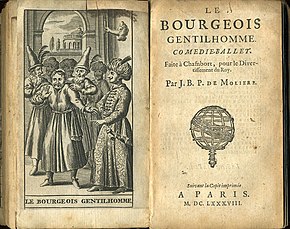Saturday, January 15, 2022
The Bourgeois Gentleman
Saturday, November 28, 2020
Herr Tartüff
Friday, August 14, 2020
The Original Tartuffe
Moliere's classic attack on religious hypocrisy, Tartuffe, originally premiered as a three-act play on May 12, 1664. The playwright's enemies were not impressed.
Immediately, the very people Moliere had criticized began to attack the play. The original script is now lost, so we don't know how much this early version resembles the text we have today. What we do know is that after it was performed at the Palace of Versailles, it was immediately condemned.
Tartuffe criticizes people who pretend to be pious, but actually are just after sex, money, and power. Religious conservatives urged King Louis XIV to ban the play, which he did, though he added that he did not doubt the good intentions of the author. Undeterred, Moliere not only revised the piece but actually expanded it into five acts.
This new version of the play premiered in November at the Chateau de Raincy outside of Paris. The King seems to have encouraged Moliere in his revising of the play, and in 1665 he even extended his patronage directly to Moliere's company. This did not stop calls to ban the piece, though, and the writer struggled to mount productions, often as private performances due to the extreme hostility toward the piece.
While Moliere was concerned with the social conditions surrounding the play, he was also concerned with providing a vehicle for the actors of his company, and they seem to have each left a mark on the piece. The writer himself played Orgon, the obsessed dupe who cares about nothing so much as his pseudo-holy houseguest Tartuffe. Philibert Gassot, known by the stage name of Du Croisy, played the title character.
Armande Bejart, who was by then known as Mademoiselle Moliere, played Orgon's wife, Elmire, while Madeleine Bejart played the sassy maid, Dorine. Madeleine had co-founded the Illustre Theatre troupe with Moliere in 1643. Though the two were romantically involved on and off in the past, Moliere had ended up marrying Armande. And while Armande was supposedly the younger sister of Madeleine, in actuality she was her illegitimate daughter. (No, not by Moliere, though his enemies later insinuated this.)
With a cast like that, one can imagine some offstage drama rivaling what occurred onstage!

